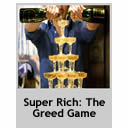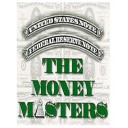In Search of the Bankers' Brain
The disastrous impact of the 2008 financial crisis still lingers today. What lessons have been learned and which steps are being taken to prevent future economic catastrophe? The informative new documentary In Search of the Bankers' Brain investigates the continuing effect of the crisis on London's economy, and profiles the mysterious bankers who have yet to rectify their corruptive ways.
The content of the film stems from the work of Joris Luyendijk, a journalist for The Guardian whose far-reaching blog focuses on matters related to finance and banking. "We know more about ancient Egypt than about the people who currently shape our lives," he observes. Luyendijk's efforts seek to unmask the key bankers, investment managers, risk management personnel, traders and hedge fund high rollers who can make or break a nation's economy.
The film also features interviews with former players of the financial game who have now embraced their status as industry whistleblowers. They all testify to a system that's sick with unregulated greed and rewards the truly ruthless with unimaginable wealth. We learn how they manage to operate in relative anonymity, and the tricks and triggers they employ to excel in their line of work.
The film's central thesis, however, regards the chemistry of greed. A psychologist chimes in to share insights on the effects of greed on the brain, and explains the cerebral characteristics that define many of the most successful masters of banking and investments. It's not a flattering portrayal; in fact, the film pulls no punches by labeling these subjects as psychopaths. They possess a level of deviance and superficiality that makes them ideally suited for victory in today's excessive and permissive financial climate. If they should incur defeat, many will resort to suicide.
Many documentaries have tackled the subject of the financial crisis over the years. In Search of the Bankers’ Brain is a work of distinction because it approaches the topic from an entirely unique perspective. By exploring the neurological components of those who rise to the top of the financial sector through questionable practices, we can better understand the corrosive culture that empowers them every step along the way.
Directed by: Jos de Putter




There is so much wrong with this documentary. I'm a City banker who worked in securitisation at the most notorious bank at the time, and I don't recognise any of the behaviours or psychopathic characters described in this film. Fact check: stockbrokers had nothing to do with the 2007-9 crash - why is Geraint Anderson on this film? Also, Joris Luyendijk's insulting diatribes against bankers as a different species and their personality defects makes it pretty clear that impartiality wasn't part of his Journalist training. I know a lot of bankers, and I cannot compare even one of them to paedophiles or heroin addicts, nor do they lead deviant lifestyles. Probably distorts the truth more than seeks to find it.
Read ,The web of Debt,and,The Public Bank Solution by Ellen Hogdson Brown.
Purchase voucher concept of money creation. If a car manufacter produces ahundred cars at a ten thousand dollar price.It may produce vouchers representing that wealth.
2009,just after the crash, satoshi nakamoto invented bitcoin to put a harness made of computer code on the unconscionable acts in the financial world......yes the unconscionable traders and corporations are still there....but below the code,where they can only hurt themselves and those that foolishly trust them.